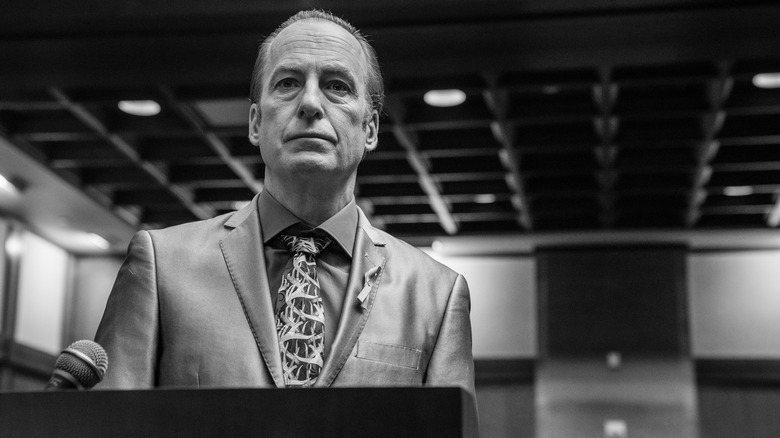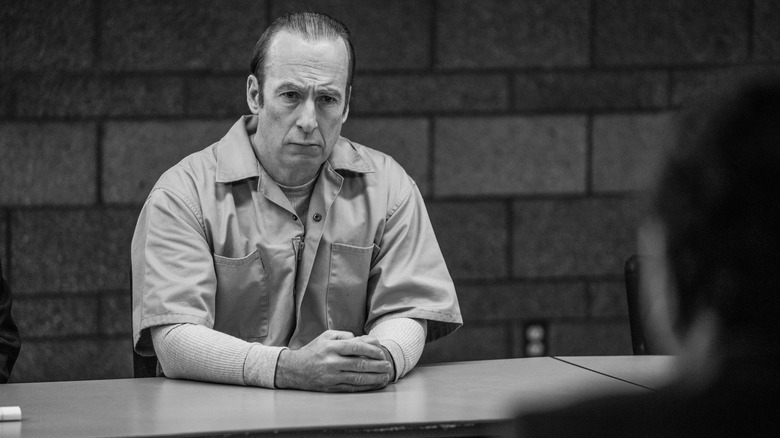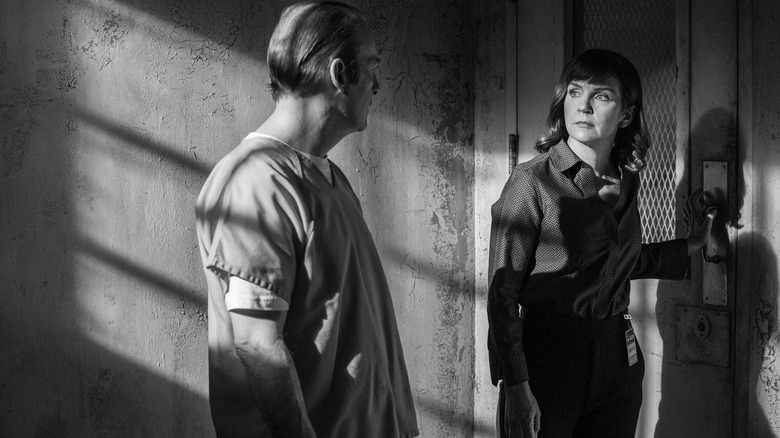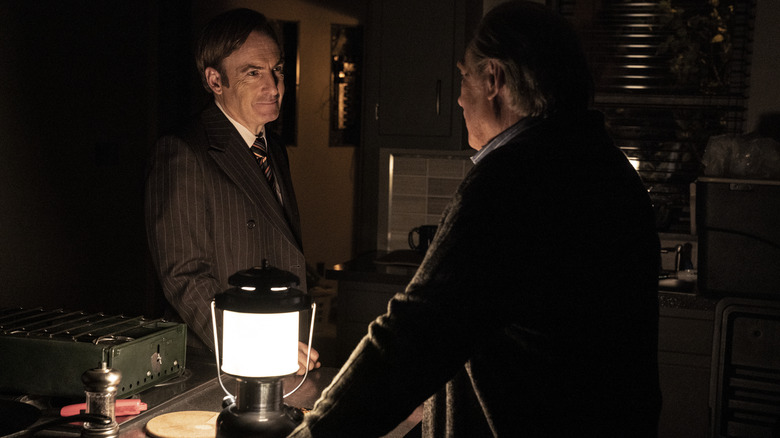The Better Call Saul Finale Features The Most Powerful Saul Goodman Transformation Yet
Over the course of "Better Call Saul," we've watched with equal parts fascination and horror as Jimmy McGill (Bob Odenkirk) has fought a losing battle against his own worst inclinations, inching ever so closely towards becoming the heartless criminal lawyer we all know he'll inevitably become. It's in the name, after all. In the lead-up to last night's series finale, appropriately and cleverly titled "Saul Gone," invested viewers were given a front row seat to the most spectacular self-implosion we've seen since Bryan Cranston's Walter White burned everything to the ground in the final episodes of "Breaking Bad."
Throughout the final episode, it seems all but certain that the man once known affectionately as Slippin' Jimmy is nowhere to be found. Having finally been arrested in a dumpster, of all places, the rest of the episode takes us through the painfully familiar scheming we've seen from Saul Goodman again and again. Having abandoned poor taxi driver Jeff (Pat Healy) to his fate with the Omaha police, put widowed Marie Schrader (a very welcome Betsy Brandt cameo) through the wringer all over again, and even made a mockery of the legal system once more by reducing a well-deserved multiple life sentence down to seven measly years in a pampered jail cell (one can almost feel big brother Chuck's withering disdain from the afterlife), nothing appears to stand in the way of yet another vintage example of circumstances ending up "with me on top, as always," as he puts it himself.
Until, that is, the full scope of his last con job comes into focus. "Better Call Saul" truly saved its best trick for last by having Saul go to such lengths simply to accept responsibility, acknowledge his sins, and, most importantly, attempt to make things right with Kim Wexler (Rhea Seehorn).
Regrets and redemption
As much as the two shows share common DNA, "Breaking Bad" and "Better Call Saul" splintered into two very different conversations leading up to their respective finales. In 2013, the question surrounding drug kingpin Walter White mostly concerned whether he would actually get away with everything and achieve everything he set out to do. Many would argue that dying on his own terms and with the kind of notoriety he craved throughout his life means that is exactly what happened. With hapless Jimmy, however, the stakes mostly revolved around whether the series would somehow find a happy ending for himself and Kim before it was too late ... and whether the pair even deserved that in the first place. The end result, fittingly enough, is a little more complicated than that.
The concept of redemption in the "Breaking Bad"/"Better Call Saul" universe has never felt entirely straightforward. Bad things happen to good people all the time in these shows, as evidenced by the countless victims and collateral damage left behind in the wake of both Walter and Saul's violent rampages throughout Albuquerque and beyond. Bad people, meanwhile, have always tended to invite their own destruction. So when Saul seems ready to throw even his ex-wife Kim under the bus in exchange for an even more reduced sentence, it's easy for viewers to assume the worst.
But something remarkably unexpected happens as the huckster and soon-to-be convicted felon takes the stand: With Kim in the room, he contradicts his own sworn testimony (which conveniently blamed all his actions on his fear of Walt) and owns up to every single mistake he made. If not redemption, then acknowledging his role in Chuck's suicide, Howard Hamlin's (Patrick Fabian) murder, and Walt's reign of terror at least hints towards atonement.
One last con
It was always about Kim. Though hardly the sole or even the biggest factor that tipped Jimmy into going full Saul during the events of "Breaking Bad," "Better Call Saul" established with one incredibly telling jump cut that Kim walking away from the ruins of her destructive life with Jimmy essentially cleared the way for his transformation into Saul. It's only fitting, then, that Kim's attempt to make things right — by admitting her own guilt in writing — finally provokes Saul to do the same.
Sitting pretty with the most generous plea deal that the veteran judge has ever seen, there's truly only one factor preventing the criminal lawyer from essentially getting away with everything he ever did. The implication that he holds Kim's legal fate in his hands, depending on how he plays his cards, finally proves to be what pulls him back from the brink. Still in his Saul persona, for all intents and purposes, we finally see a glimmer of conscience in the man who once aided and abetted Walt in the absolute worst of his crimes without a second's hesitation.
In a neat echo of Walt's own admission that "I did it for me," Saul puts the blame solely on his own desire for power and money. For the first time since the tragic death of his brother Chuck (Michael McKean, who also makes a wonderfully unexpected return), he confesses his long-simmering guilt in pushing him so far. (Remember, Jimmy once failed to be reinstated as a lawyer because he couldn't even bring up Chuck's name during a hearing.) And in one beautifully cathartic declaration — "The name's McGill. I'm James McGill" — we see the official end of Saul Goodman and the reemergence of Jimmy as Kim looks on gratefully.
Saul good, man
In its concluding moments, "Better Call Saul" makes it abundantly clear that the man who once used to lean against the concrete wall of a parking garage and share cigarettes with his lover Kim has made his long-awaited return ... even if Kim Wexler's the only one who'll ever recognize it.
To his Cinnabon employees, he'll always be the kind (if distant) manager who used his one phone call from prison to check on their own well-being. To his fellow practicing attorneys in and around Albuquerque, he's the grifter who put a black mark on their profession and was finally undone in the bottom of a dumpster, self-imploding in spectacular fashion to parlay a seven-year plea deal into an 86-year life sentence. To the grieving Marie Schrader, he'll always be the sole surviving target of her anger and pain — and rightfully so. But to Kim (and, by extension, us), he at least got to bow out as Jimmy: the flawed, good-natured con artist who pulled one final rabbit out of his hat when it mattered most.
By taking responsibility and allowing himself to face the consequences, he achieved what Walter White couldn't. By enacting one more con, he exacted a measure of redemption — which won't tip the scales of justice one way or another, but will allow him to live with himself. By exorcizing his own Saul Goodman-shaped demon in one beautifully sincere and long overdue courtroom confession, he finally used his slippery talents in favor of a greater good beyond his own.
"Better Call Saul" went out on its own terms as a stunning companion piece to one of the greatest shows of all time and a brilliant portrait of a wonderfully complex character in his own right. Saul gone, indeed.



